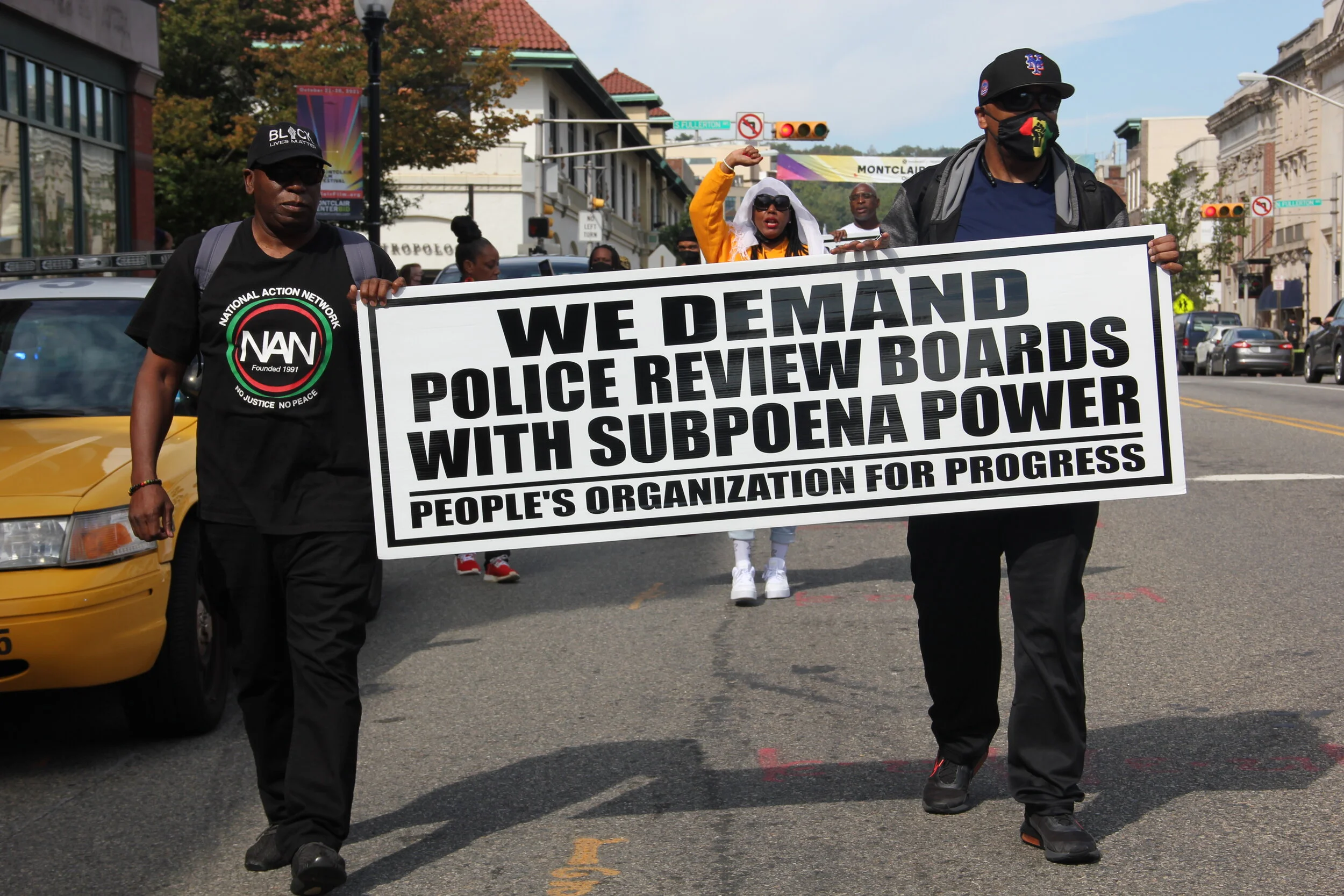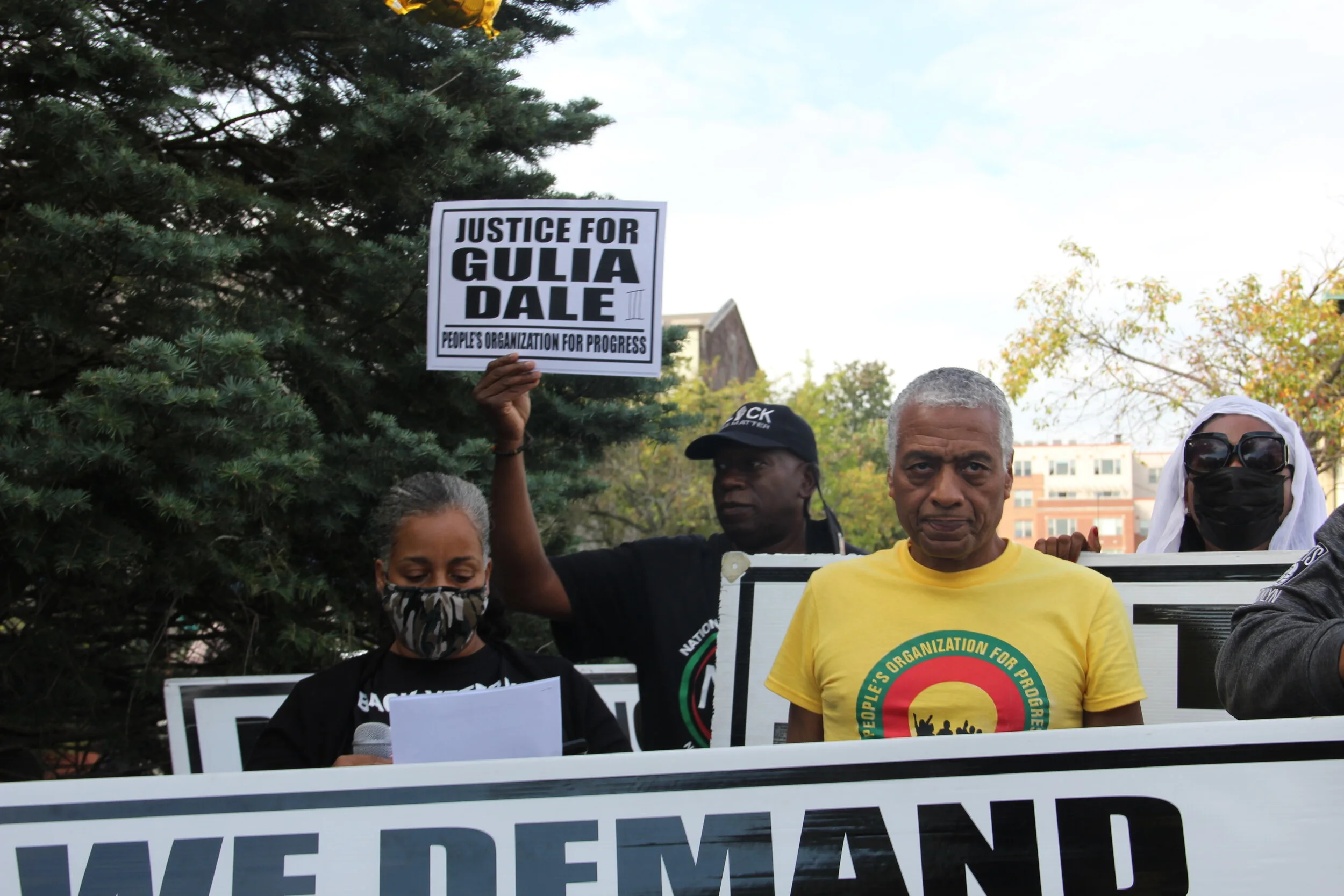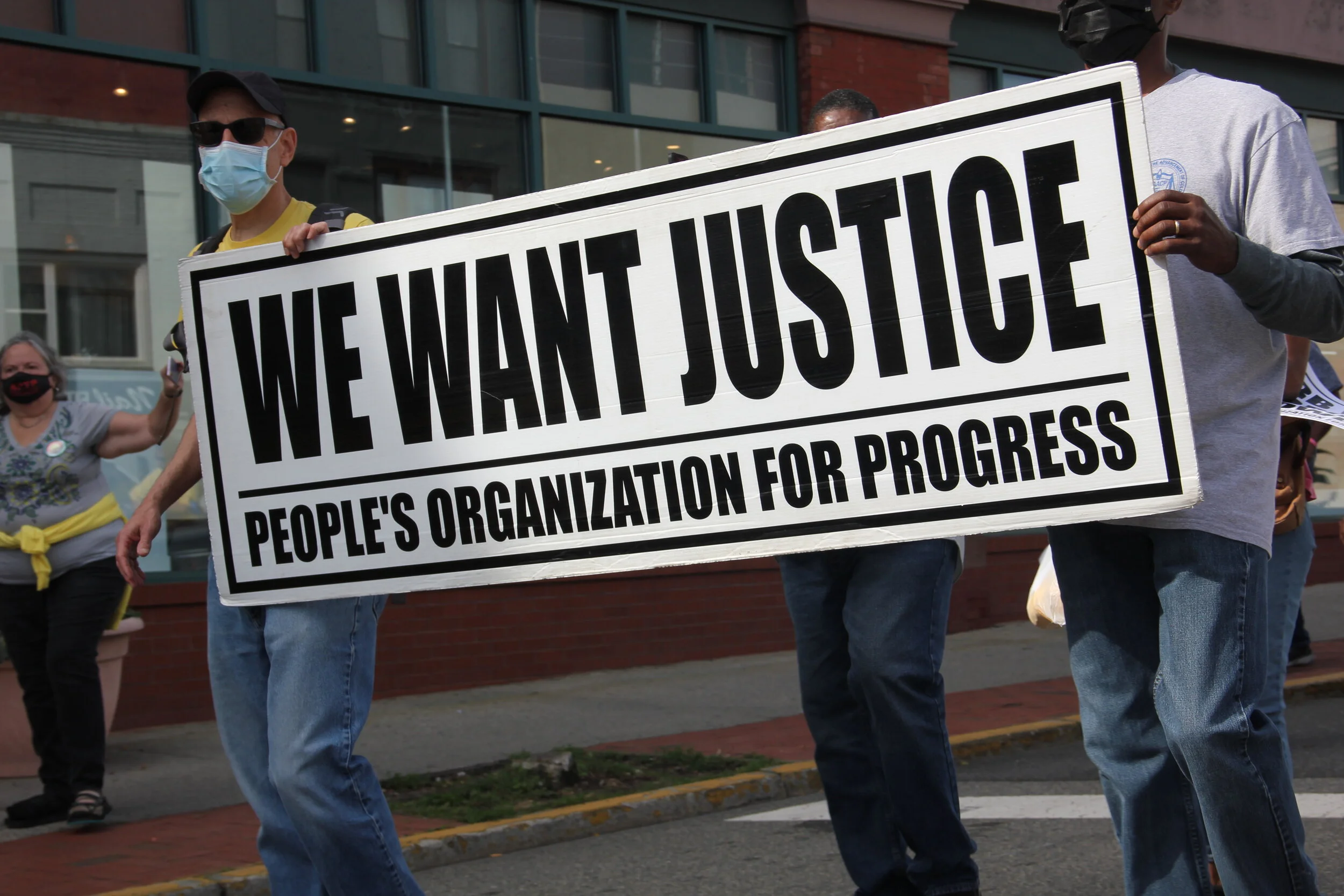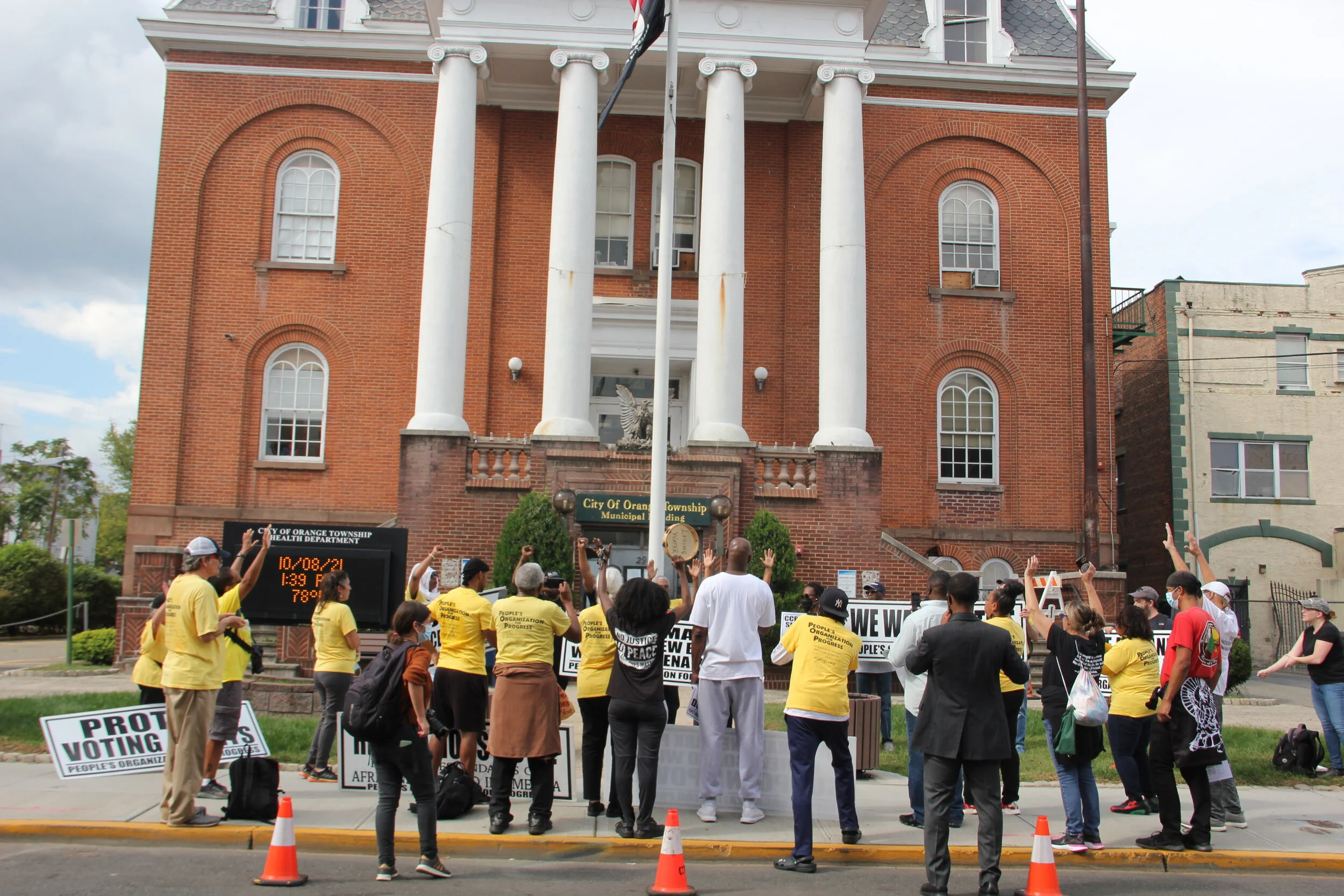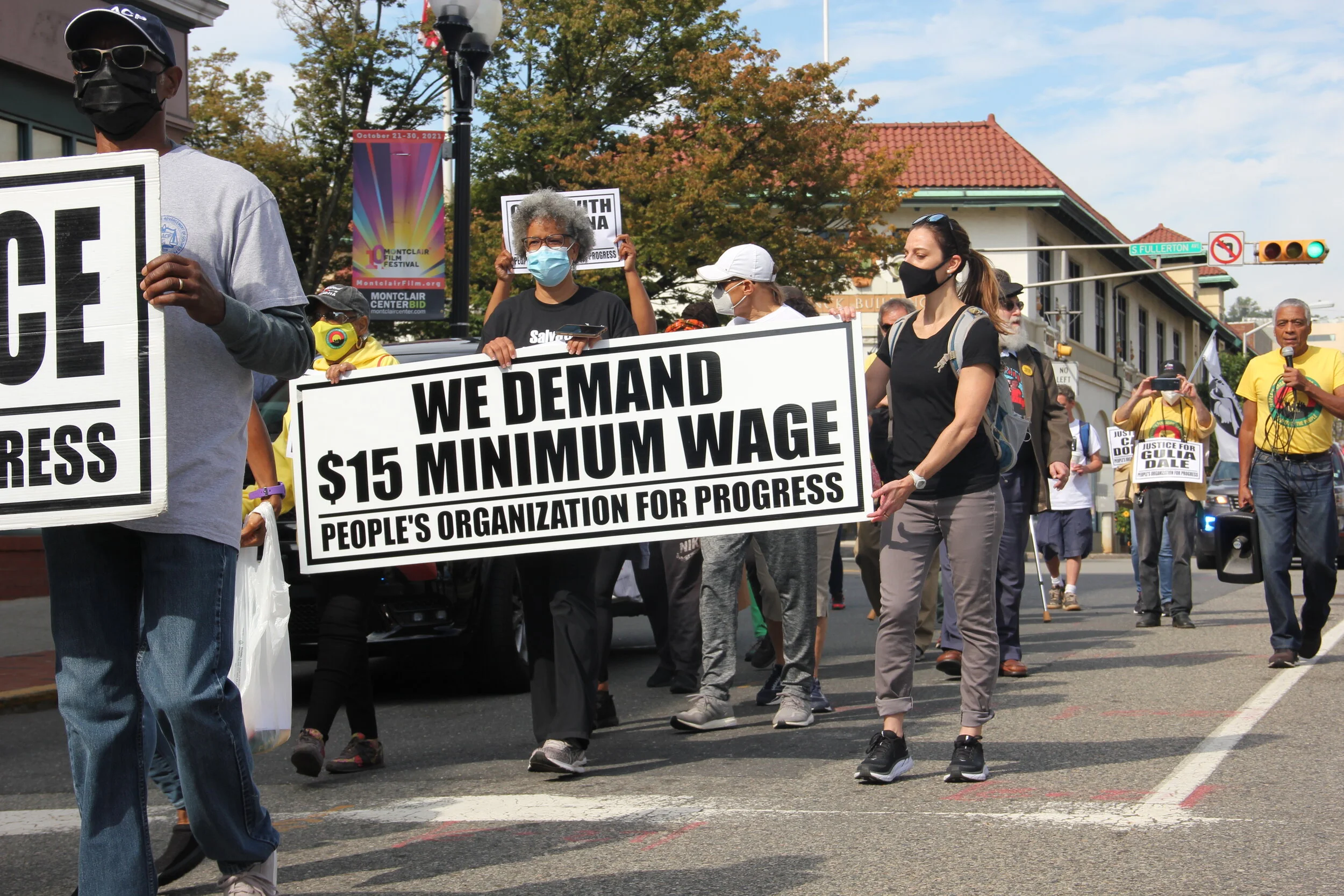POP’s 67-mile long march for justice
Public Square’s Engagement Editor, Esther Paul, guides us through the 67-mile Long March for Justice which began in Lawrence Township and ended in Trenton, NJ, Oct. 16.
MONTCLAIR-NEWARK, NJ—On Friday, Oct. 8, members and supporters of the People's Organization for Progress, or POP, began their 'Long March for Justice' in Montclair. The 67-mile march will span 22 towns and cities and culminate in Trenton on Saturday, Oct. 16. With the support of organizations including Newark Communities for Accountable Policing, Black Lives Matter of NJ, the National Action Network's Atlantic City Chapter, and the Trenton Anti-Violence Coalition, POP is marching for police accountability and social justice, and economic progress.
"We want an end to the use of excessive force. We want an end to the violation of our constitutional rights. We want an end to unjust arrests. We want an end to police brutality," said Larry Hamm at the rally kick-off on Friday. Hamm, the Chairman and founder of POP, has led the Newark-based protest organization since 1982 and organized numerous marches against poverty, oppression, racial discrimination and injustice.
We revisit the first leg of the Long March for Justice and the issues POP sees as avenues for equity and justice for all people.
Police Accountability
Two POP members holding a banner during day one of the ‘Long March For Justice'.’ The march started in Montclair and ended in Newark, NJ. Oct., 8, 2021. (Josie Gonsalves for Public Square)
"We want an end to the murder of unarmed civilians, and first and foremost in that regard, we want police review boards with subpoena power," said Hamm, citing a list of demands for police accountability measures. Namely, POP is calling for the passage of A4656/S2963. The bill, introduced in September of 2020, would authorize the creation of civilian review boards with subpoena power in every New Jersey municipality. If passed, the bill would give citizens greater authority to investigate police misconduct.
To date, Newark is the only city in New Jersey with a civilian complaint review board. An independent department in the City of Newark, Newark’s Civilian Complaint Review Board (CCRB) was established in 2016. That year the city reached a settlement with the U.S. Department of Justice to implement significant reforms in the Newark Police Department intended to prevent unconstitutional stops, searches, and use of excessive force. Changes included revised search and seizure policies and the deployment of in-car and body-worn cameras. And while Newark's CCRB's stated mission is to "foster positive relations between the Newark Police Department (NPD) and the Newark community by providing transparency, fairness, and equality in the practice and policies of the NPD," without subpoena powers, the board has limited means to protect residents.
In 2020 the New Jersey Supreme Court overturned an appellate court decision supporting a Newark City ordinance that gave the CCRB subpoena power and access to Internal Affairs investigative documents. City attorneys have since appealed the decision to the U.S. Supreme Court.
During the rally, the POP is also calling for the passage of measures including S2656, which would grant public access to police disciplinary records, bill S2617 designated as George Floyd’s law, which bans law enforcement use of chokeholds.
Abdul Malik Mohammed giving a speech during day one of the Long March For Justice in Montclair, NJ. Mohammed is the stepfather of Carl Dorsey, who was shot and killed by New Jersey police in Jan. 2021. (Esther Paul for Public Square)
During the rally, the family members of Carl Dorsey and Gulia Dale III, two Black men killed by New Jersey police earlier this year, joined POP in demanding justice and investigation of police shootings.
Dorsey, 39, of South Orange, was unarmed when fatally shot by a detective of the Newark Police Department on New Year's Day. Gulia Dale, a 61-year-old army veteran, was shot and killed on the Fourth of July outside of his home in Newton, NJ. Family members concerned for his safety had called police, fearing the sound of nearby fireworks had triggered a post-traumatic stress disorder attack.
From left: Valerie Cobbertt alongside Lawrence Hamm giving a speech during day one of the Long March For Justice in Montclair, NJ, Oct. 8, 2021. Cobbertt is the sister of Gulia Dale, a U. S. Army veteran shot and killed by NJ police on the Fourth of July. (Josie Gonsalves for Public Square )
“My brother served the country honorably for over 30 years and was a proud army major and received numerous awards [for] his contributions to this nation, said Dale’s sister, Valerie Cobbertt. “We’re looking for a true account of what happened that night,” she said, drawing a comparison to the case of Edwin Greene, a Newton man who was arrested and charged with attempted murder last January after firing at police who tried to prevent him from committing suicide. “When you look at what happened earlier this year in Newton concerning a white resident, Edwin Greene, my family can’t help but to think that my brother was treated differently because he was Black.”
Social Justice
"We're here today to say, stop voter suppression. Stop all of this legislation designed to suppress our right to vote and pass the "For the People Act." And pass the John Lewis voting rights act in Congress," said Larry Hamm.
Both measures seek to bolster voter participation and ensure fair elections in the U.S. The “For the People Act”’ would support voter registration through same-day registration, vote-by-mail, and early voting. The bill also seeks to limit the purging of voters from voter rolls, curb unfair congressional redistricting, and promote election and campaign finance integrity, respectively, by demanding the disclosure of 10 years of tax returns from the President, VP, and other candidates and strengthening bans on campaign spending by foreign nationals. The S.4263 Congressional bill, also known as the John Lewis Voting Right Advancement Act, would enforce a federal preapproval process for states and political subdivisions looking to change voting practices. The bill also would also expand voting access on tribal lands.
POP members marching through the city of Orange, NJ during day one of the Long march For Justice, Oct. 8, 2021. (Josie Gonsalves for Public Square)
As part of sweeping social justice reforms, POP is also championing reparations legislation.
“There is a law in the NJ Assembly. It is A711/S322. That bill would do essentially the same thing that H.R.40would do in Congress. It would create a commission to study and make recommendations for the implementation of reparations for African Americans,” said Larry Hamm. “This country has given reparations before... It has given reparations to our Japanese brothers and sisters for their internment in concentration camps…It’s given reparations to a limited degree to some Indigenous peoples in this country. But if this country has money for trillion dollar tax breaks for millionaires, then it has money for reparations for African Americans in this country.”
POP members during day on of the Long March for Justice at the City Hall of Orange, NJ, Oct. 8, 2021. (Josie Gonsalves for Public Square)
Economic progress
“It’s a damn shame what’s happening to working people, the middle class and poor people in this country. We see the increasing economic commiseration of the masses of the people. Meanwhile, we have the greatest upward distribution of wealth in the history of the United States,” said Hamm. Viable pathways for economic justice in this country include an end to student debt, tuition-free college education, and a doubling of the $15 federal minimum wage signed into law by way of President Biden’s executive order this year. Currently, the minimum wage for most New Jersey workers is $12.00 an hour. According to POP, the U.S. must go further to ensure all residents and citizens can access fair wages and quality of life.
POP members during day one of the Long March For Justice, Oct. 8, 2021. (Josie Gonsalves for Public Square)
Day one of the march ended at Newark’s city hall. By Saturday, Oct. 16, POP protesters will have marched to Trenton, the final stop in this ‘Long march for justice.’
An energized Larry Hamm was hopeful and pleased with the turnout so far. "I feel a little tired," he said as POP wrapped the first day of protests. "I'm just amazed how we made it through those 13 miles today... It feels like one minute we were in Montclair the next minute we're here in Newark, and I'm so happy so many people joined us along the way."

